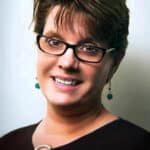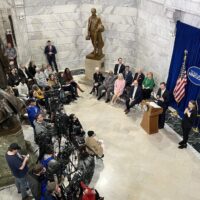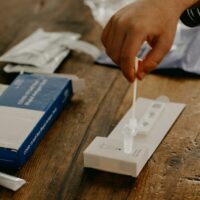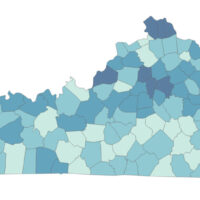While most of the country eases back into post-pandemic life, some rural areas are quietly remaining in COVID-mode.
In rural Missouri, for example, a quarter of the state’s 81 nonmetropolitan counties had increasing rates of COVID-19 last week. A small rural hotspot has emerged in northern Missouri, where Putnam County had the highest infection rate in the U.S. last week — over one percent of the county’s 4,700 residents contracted COVID-19 in the last week alone.
Increasing cases and lower vaccination rates are part of the reason rural health care providers need resources that will help them talk to residents about the vaccine, according to the National Rural Health Association. The NRHA has created a resource library to help do just that.
Developed in coordination with the organization’s partners, the library pulls together toolkits on how to increase COVID vaccination rates in rural areas.
“We were hearing requests from our membership for rural-relevant curated resources that they could use to increase vaccination rates,” said Alan Morgan, chief executive officer.
After checking with partner organizations to ensure that those resources weren’t already out there, the organization worked to create a place for rural health care providers, community members and others to find rural-centric vaccine resources.
The toolkit not only includes op-eds for community health care providers to give to local newspapers, but how to talk to rural residents about the vaccine.
Included in the toolkit is a list of words and phrases that are more helpful in getting rural residents vaccinated. Instead of “defeat, crush (or) knock out the virus”, it encourages health care professionals and others to say “eliminate, eradicate (or) get rid of the virus.” Instead of “physical distancing”, the toolkit recommends saying “social distancing”. Rather than say “orders, imperatives (or) decrees,” the toolkit recommends saying “protocols.”
The list was developed, Morgan said, with the help of communications professionals who have helped rural hospitals communicate with their patients for decades.
“We really wanted to switch the messaging for rural communities,” he said. “We want to say how do we approach this within our own communities? What is necessary for our communities and how do we tackle this together to keep our businesses open?
It’s more of a pivot from the government telling you that you should be doing this, to saying ‘Okay, what do we as a community need to do about this?’ ”
Now, Morgan said, the toolkit was being shared with health care providers, faith-based leaders and agricultural leaders, like large animal vets, in an effort to influence more rural residents to get the vaccine.
“We recognize that among the rural communities, influencers like the (large animal) vets are going to be key in this,” he said. “We stressed from the very beginning of this that you have to cast a very broad net when you’re dealing with this in a rural community.”
So far, the toolkit has been picked up as a resource by the federal government as a resource for rural communities.
“We’re in daily contact with the CDC (Centers for Disease Control and Prevention) and have been throughout this pandemic,” he said. “The CDC is large with a lot of different areas that are doing a lot of different things. That’s the reason why we were excited on Friday to see that the CDC had shared our toolkit as another resource as well. I think that is a good example of public-private partnerships to address the pandemic in rural areas.”
Although some areas of the country are dropping their masks and plotting a path towards pre-pandemic normal, it’s important, he said, for rural health care providers and other leaders to use resources like the toolkit to get as many people vaccinated as possible.
The Daily Yonder’s coverage of COVID-19 vaccinations in rural America, including the role of business in supporting employees and communities, is supported in part by the Health Action Alliance.






